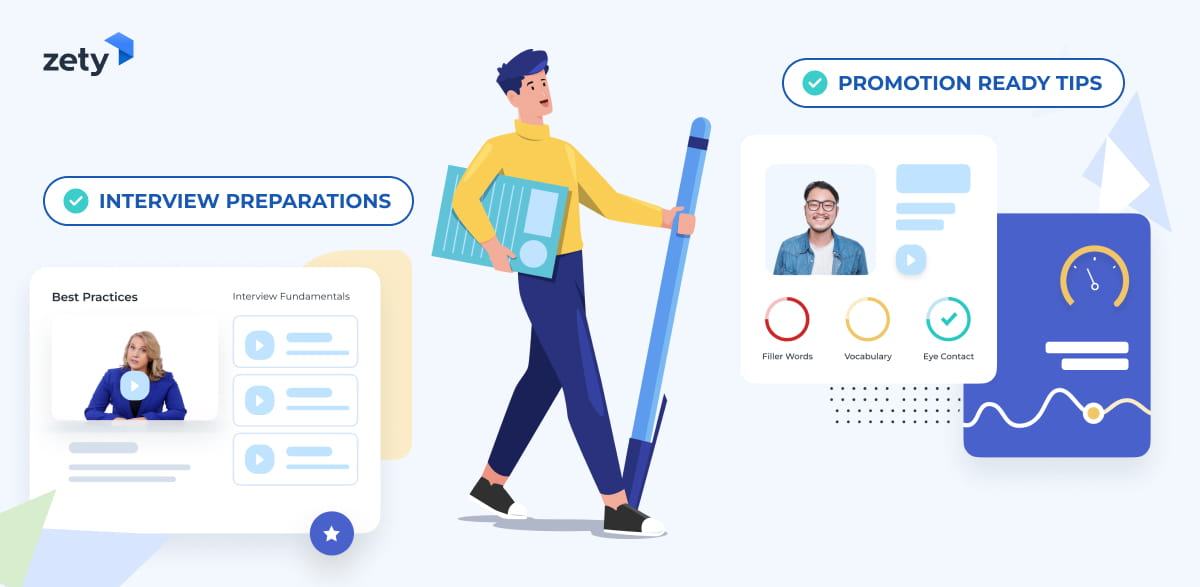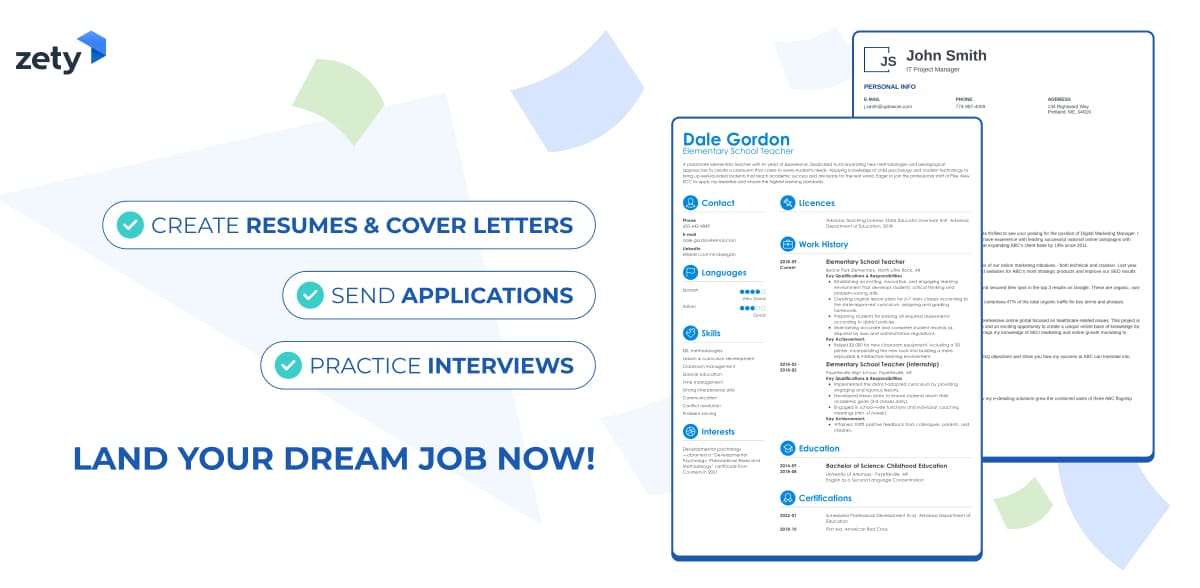Not All Who Wander Are Lost a.k.a. My Career History
Create Your Resume NowWhat happens when you combine an aspiring artist, a failed mathematician, an art historian, an avid traveler, a retired teacher, and a content writer? A career expert, apparently!
This is the story of how I turned my very colorful life experience into powerful career wisdom to help other restless souls like I stand their ground in the world of work. Want to know how I did it? Then read on!
Do you want to hear you’re hired? Then start practicing with expert interview coaches now. Get access to a mock interview tool, use an impressive questions library to record your answers, and receive instant feedback. Don't let another opportunity pass you by.
Turn your next interview into a dream job offer.
Dazed and Confused, or Being a Young Adult
As a teen, I dreaded the question I was constantly asked: “What do you want to do after high school?”
The truth is: I had no idea.
While my friends dreamt of becoming doctors, lawyers, and engineers, none of these traditional careers appealed to me. Considering my strengths didn’t help: I was very good at math and art. Unfortunately, my impostor syndrome was at its highest, so there was no way I could be convinced I was good enough to go to art school. So… I became a Mathematics student.
Spoiler alert: That didn’t go well.
I dropped out after completing the first term. My class schedule was insane, and I simply couldn’t keep up with the coursework. I felt like a failure but also knew there was no point in pushing myself to continue studying.
Everyone’s a Critic
The following October, I was excited to start the academic year as a freshman Art History student. However, that enthusiasm started waning around the sophomore year. At some point, I took a long, critical look at my future career prospects and found out that… there aren’t that many positions requiring art history knowledge. Europe was undergoing a youth unemployment crisis. On top of that, the unemployment rate in Poland was over 10%. My future as an art historian didn’t seem very promising.
I’m Going on an Adventure!
In May 2012, I received my master’s degree. My initial pride gave way to disappointment when, three months after graduation, I still couldn’t find a full-time job. I was lucky enough to work part-time for my family’s business, but that wasn’t the life I wanted.
One day, my friend asked me if I wanted to go to China and teach English there.
At first, the question seemed insane. Me? Teaching? I was a total introvert, and that didn’t sound like a job for introverted people. But the more I thought about it, the more tempted I felt. I didn’t have much to lose, after all.
So, about a month later, I spent all my savings on a ticket to Shanghai.
Surprisingly, teaching was easier than I expected. Even more surprisingly, I was pretty good at it. After two exciting years in China, I obtained a Certificate in Teaching English to Speakers of Other Languages from Cambridge. My next teaching jobs were in Moscow, Russia, and Astana, Kazakhstan. More importantly, teaching helped me to overcome my natural shyness. It developed my communication skills and my interpersonal abilities. It also gave me an outlet for my creativity. I loved inventing new activities for students and experimenting with different teaching methods.
While most of us associate teaching with children, many of my students were adults. Some waaay older than me. I enjoyed working with them because it was more than just explaining grammar and teaching vocabulary. I did my best to help them become better communicators and gain confidence. Learning English could help them advance in their careers, so my lessons often involved topics related to workplaces and corporate culture. I also used coaching activities to help my students find their strengths and set SMART career-related goals.
But there was one downside to teaching.
Not All That Shines Is Gold
I’m a perfectionist. It’s a trait that makes me achieve high goals quite often. But my negative perfectionism also tells me I’m not good enough and should try harder. All. The. Time.
What does it mean for a teacher? It means that no matter how much effort I put into preparing lessons, it never felt enough. There were weeks when I got up at 8 to prepare for afternoon classes, started teaching at 2 p.m., finished at 9 p.m., and went home to prepare for the next day’s classes till midnight. I spent all my waking hours preparing things for students. I discussed cool lesson ideas with my partner at weekends and debated teaching methodologies at parties.
I wasn’t very good at handling all that stress, so one day, my anxiety went off the roof, and I thought I was having a heart attack.
I knew I had to change something. I loved teaching, but this lifestyle wasn’t sustainable for me.
New Beginning
I came back to Poland for good in 2018. I was over 30 and in need of a career change but with very little idea of my next move. Since I’ve already had a few years of work experience up my sleeve, I tried applying for management positions that matched my skill set. Teaching taught me how to work with deadlines, manage tight schedules, deliver training sessions, and coordinate groups of people. But despite putting a lot of effort into writing my resume, I received very few interview invitations. My experience of working abroad was very incompatible with what employers expected.
So I had no choice but to start applying for entry-level jobs. And let me tell you: it was a very humbling experience. During job interviews, I answered questions from hiring managers who were nearly 10 years younger than me. I felt overdressed when I arrived for interviews wearing business casual clothes. Corporate offices scared me with their chaotic floor plans, sterile interiors, and never-ending rows of desks.
But, finally, I landed a job!
Going through job ads made me realize that being able to write well in English is my best asset. Everyone claims that they can speak English, but writing skills are a different story. And companies needed creative people who could write engaging articles about their products and services. So I joined one of them and started my adventure as a content writer.
The Winter of Our (Dis)Content
Let’s not be too glamorous—writing content isn’t as creative as I’d like it to be. There are general rules that must be followed, and on top of that, each company has its guidelines concerning the brand voice, topics, length of text, etc. But the upsides were significant:
- I could pick my working hours.
- I could take vacation pretty much whenever I wanted.
- I could work from home from time to time.
- I had zero responsibility for anyone else.
- I received proper health insurance.
- I finally had the work-life balance I wanted.
Compared to teaching, this job seemed so easy that I couldn’t believe it. Plus, the work environment was so laid-back that some people came to work wearing pajamas. Everyone was super friendly, and I met many cool people I still keep in touch with.
However, after a while, I got really bored with the content I had to write. There were days when I had to describe 10 nondescript massage salons, each in a unique and creative way. Or provide an enticing description of a toe fungus treatment. I grew restless.
And then… the COVID-19 pandemic happened. I was one of the lucky people who didn’t lose a job. The company adapted to remote work pretty quickly. That made me postpone the idea of changing jobs again. Well, that and the fact that it was virtually impossible to find job openings, as many businesses closed down.
Time passed. Vaccines were developed. Companies started encouraging employees to go back to the office. And I started looking for a change, again. I was happy with writing and working remotely—but I couldn’t stand writing e-commerce descriptions anymore. So I embarked on the search for more meaningful content to write.
Career Expert? Me?!
Writing advice pieces is not easy. The most important thing: the author has to know the thing they write about. Was I an expert in anything? I haven’t done any real teaching work in years. I stopped following the art market as soon as I got my degree. I am an experienced traveler, but so are millions of people on Instagram.
One day, while talking with friends about work, I realized one thing. I was pretty good at… finding jobs.
Most people I know have been working for one employer for over a decade. Meanwhile, I changed not only companies but also careers a few times already. And each time, I was successful in finding work. I could write a resume for me, my partner, and any of my friends with my eyes closed—I’ve done it so many times it was a piece of cake. I could easily point out what kind of work could match my friends’ skill sets. I knew how to develop new skills and how to highlight them in a job application. Plus, I experienced dozens of job interviews and knew the answers to common questions by heart.
Writing about work-related topics sounded like a great idea. It would smoothly combine my writing skills, my knowledge of the corporate world and job searching, as well as giving advice that’s grounded in real-life experience. And that’s how I became a career expert at Zety. I jumped on board so I could write content that can support anyone in need of reliable advice, no matter which career stage they’re on. To prove my worth, I joined the Professional Association of Résumé Writers and Career Coaches and became a Certified Professional Résumé Writer.
My own experience with switching careers taught me several things that I can also advise others. Here they are:
- Be realistic about your options: transitioning to a new career may involve applying for jobs way below your current pay grade. Your new managers might be from a different generation, and they will have more experience than you. If you can’t accept these facts, then switching careers will be very difficult for you.
- Know your strengths: this is the most important career tip. Understanding your strengths and weaknesses will help you find jobs that match your skills. They will also point you in the right direction in terms of professional development. It’s better to be excellent at a decent job than average in a prestigious profession.
- Develop transferable skills: it may turn out that they’ll get you further than hard skills, especially if you decide to try a new career path. Literally every position requires some degree of communication skills, problem-solving, time management, and organizational skills.
- Life before work: it’s not just about the legendary work-life balance. It’s also about putting your values above workplace expectations. You don’t have to conform to standards that don’t match your ethics.
If you want to read some of my career advice pieces, here’s a nice selection for you:
- Common Reasons for Leaving a Job
- What Is the STAR Interview Method?
- The Interpersonal Skills You Need to Succeed
- How to Succeed in a Group Interview?
Getting ready for an interview? That’s great! How about finding even more opportunities? The best way to apply is with a resume created in our auto-fill resume builder. Attach a professional cover letter from our cover letter builder to create an irresistible duo.
Make a resume template and a cover letter template work together, and get ready for your incoming interviews!
Thanks for reading! If you have any questions about me or my career history, feel free to add a comment below. I’ll be happy to reply!
About Zety’s Editorial Process
This article has been reviewed by our editorial team to make sure it follows Zety's editorial guidelines. We’re committed to sharing our expertise and giving you trustworthy career advice tailored to your needs. High-quality content is what brings over 40 million readers to our site every year. But we don't stop there. Our team conducts original research to understand the job market better, and we pride ourselves on being quoted by top universities and prime media outlets from around the world.
Sources
- https://www.ilo.org/wcmsp5/groups/public/---europe/---ro-geneva/---sro-moscow/documents/publication/wcms_345423.pdf
- https://www.ilo.org/wcmsp5/groups/public/---dgreports/---inst/documents/publication/wcms_449932.pdf
- https://www.researchgate.net/publication/27826551_Negative_Perfectionism_Examining_Negative_Excessive_Behavior_in_the_Workplace


